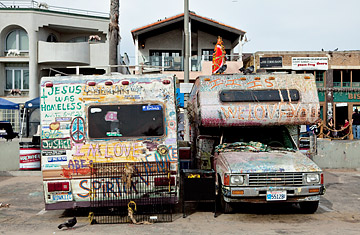
Homeless people live in motor homes and campers near Venice Beach, Calif.
(2 of 2)
Some of the floating economic refugees, especially those from the middle and working classes, "do not think of themselves as homeless," says Susan Price, director of homeless services in Long Beach. "They think, 'I'm not that. I am just living in my car.' " In fact, living in your car counts as being homeless, according to the Federal Government. Peggy, 58, who lives in a small RV on a quiet Hollywood side street, says, "If I had known how hard it is to be homeless and how hard it is to escape, I would have called all my friends to ask for help. But I was embarrassed." She was laid off from her telemarketing job in January 2009. "It was the same day that 76,000 people were laid off. I did not feel alone. I liked my job. It was within walking distance of my apartment." Her mother gave her the nearly 20-year-old RV that houses Peggy and her dog Fluffy. Wearing tennis shoes and a leather jacket, Peggy says she misses her apartment but enjoys still being in the neighborhood. "I sweep the sidewalk and pick up the trash," she says. "There is a real sense of community here."
"I know I am homeless," says Agnes Cooper, 58, who parks her silver 2006 Chevy HHR hatchback at a local gym in Phoenix. "If [the managers of the gym] know, they haven't said, and I have not asked permission. When I first slept in my car, I was parking at a Burger King, but the young kids made fun of me, and I am not accustomed to children being disrespectful." Cooper says her passenger seat folds down flat and she sleeps well. She works out and showers every morning and says the gym is "the best thing that ever happened to my body." A series of physical ailments to her back, legs and wrists caused her to stop working as a registered nurse; that, coupled with the death of her husband, forced her from her apartment.
Cooper says she faces a choice. She receives $909 a month in Social Security. After her bills, she has $289 left, plus the $100 she now pays for storage. She could spend that money to move into subsidized housing, but if she did, then she would be nearly broke: little money for food, no money to give at Sunday services, no money to buy her grandchildren gifts and no money to give to others in need — things she does on a regular basis. Now that her health has improved and her back is stronger, she hopes she can go back to work, at least part time.
Cooper's situation will be stable until she loses her car. Price says, "When people can no longer can afford to register their car and the police tow it, then people are on the street. That is the last rung. The towing and impounding charges are steep, and frequently people lose everything." Rudy Salinas, who directs the PATH outreach team in Los Angeles, says, "Allowing people to park on the street is a short-term solution. It is great for tonight, but not for next year."
"It's no fun living in your car," says Mike, a lighting specialist in the Los Angeles entertainment industry who has been out of work for a year. One of his last jobs was the Academy Awards show. "I don't have a job right now, in part because of my situation. Did you know that 50% of people who are homeless and living in their cars have jobs?" He keeps his vehicle registration current and parks his van on side streets on L.A.'s west side and in the San Fernando Valley. "You want to park where it is safe and inconspicuous. Not a busy street where someone might plow into you, and not a place where the bums will bother you," Mike says. "If the police hassle you, they'll impound your car and you'll lose everything. I don't want to find out."
